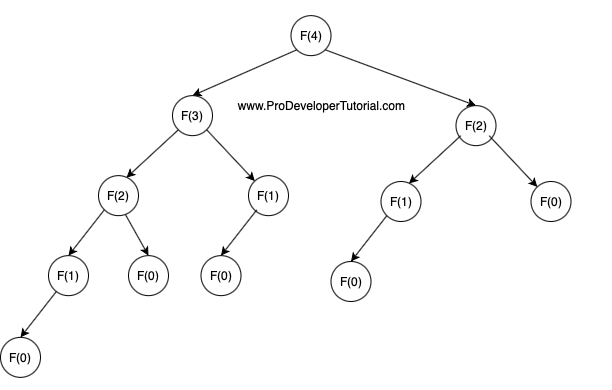Problem Statement:
You are given a number, you need to find the sum of the 2 preceding Fibonacci sequence.
F(n) = F(n-1) + F (n-2)
Example
Input : n = 2
Output: 1
F(2) = F(1) + F(0) = 1 + 0 = 1
Solution
We can solve this problem by:
1. Recursion
2. Top down approach
3. Bottom Up approach
1. Recursion
We can solve this by recursion.
If n = 4, the recursion tree is as below:

We can define recurrence relation as below:
fib(N-1) + fib(N-2);
2. Top down approach
We can change the approach to memoization. We will take a temp array to store the intermediate result.
3. Bottom Up approach
We can optimize the space complexity by storing the previous 2 values.
Solution in C++
#include <algorithm>
#include <iostream>
#include <string>
#include <queue>
#include <vector>
#include <unordered_set>
#include <list>
using namespace std;
int get_n_fib_recursion(int N)
{
if(N == 0)
return 0;
if(N == 1)
return 1;
return get_n_fib_recursion(N-1) + get_n_fib_recursion(N-2);
}
int get_n_fib_top_down(int N)
{
if(N < 2)
return N;
int dp_arr[N+1];
dp_arr[0] = 0;
dp_arr[1] = 1;
for(int i=2; i<=N; i++)
dp_arr[i] = dp_arr[i-1] + dp_arr[i-2];
return dp_arr[N];
}
int get_n_fib_bottom_up(int N)
{
if(N < 2)
return N;
int a = 0, b = 1, c = 0;
for(int i = 1; i < N; i++)
{
c = a + b;
a = b;
b = c;
}
return c;
}
int main(int argc, char const *argv[])
{
cout<<"The nth fib using recursion "<< get_n_fib_recursion(4)<<endl;
cout<<"The nth fib using top down "<< get_n_fib_top_down(4)<<endl;
cout<<"The nth fib using bottom up "<< get_n_fib_bottom_up(4)<<endl;
return 0;
}Output:
The nth fib using recursion 3
The nth fib using top down 3
The nth fib using bottom up 3